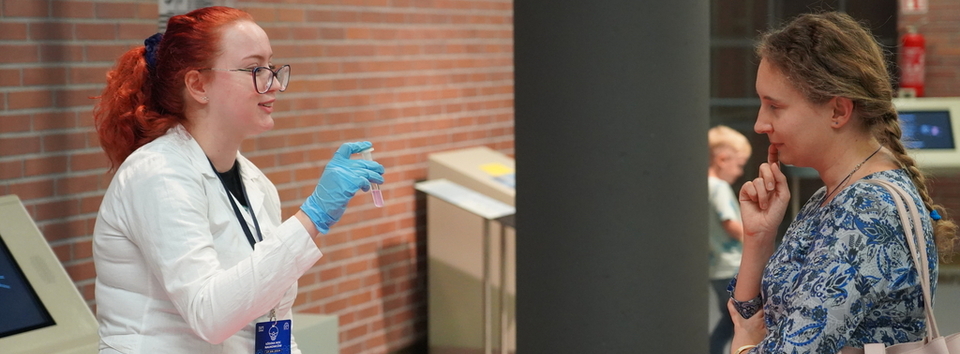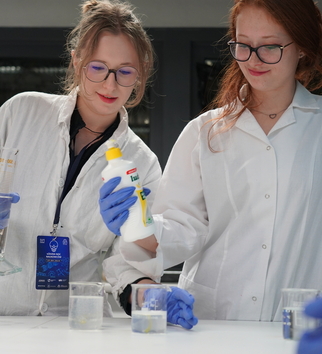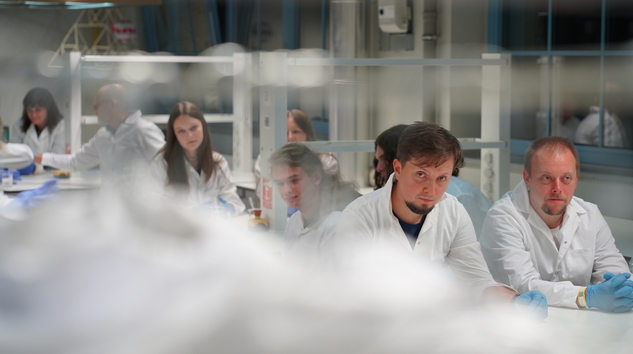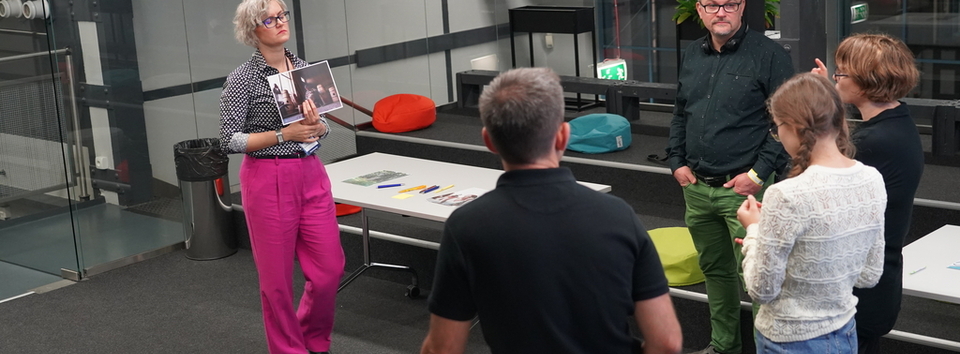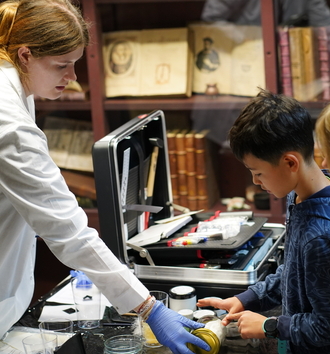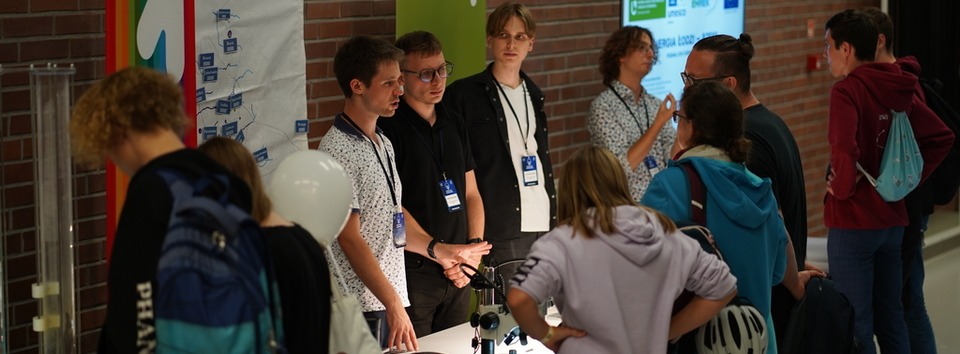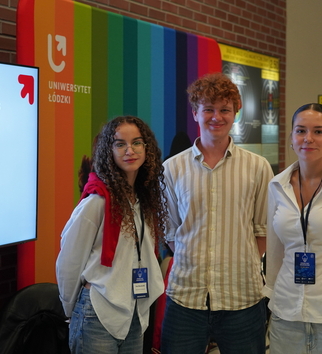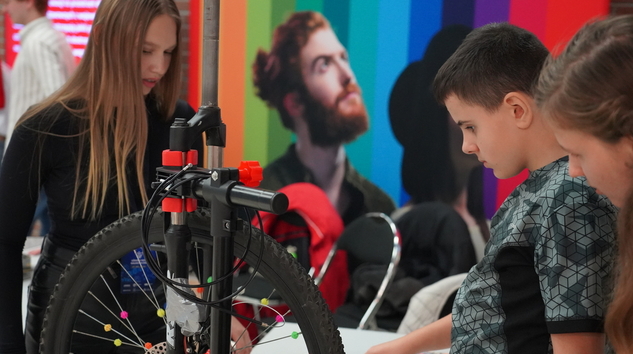The walls of the EC1 Science and Technology Centre building were filled to the brim with scientific enthusiasm. We learned about the Arctic in the context of the Earth's environmental problems, an innovative method of diagnosing heart failure using radio waves, we discovered animals living in the rivers of Lodz and the human body in social contexts. During the 2nd Lodz Night of Scientists, thanks to the participation of the University of Lodz community, there was no shortage of, among other things, chemical experiments, fascinating projects created by students and thrills in the forensic zone.
This year our university was represented by representatives of the following University of Lodz faculties: the Faculty of Biology and Environmental Protection, the Faculty of Law and Administration, the Faculty of Economics and Sociology, the Faculty of Chemistry, the Faculty of Physics and Applied Informatics, and the University of Lodz “Innovation Laboratory” project.
A lecture by Jarosław Brodecki from the Faculty of Biology and Environmental Protection of the University of Lodz took place in the Auditorium.
It was entitled "Human -> energy -> change - what does the Arctic have to say about it?"
Human activity has an impact on the nature around us – even in the wildest parts of the globe. The host invited us to view a photographic report of the expedition to the Arctic, where, as if through a lens, we could see the environmental problems of the Earth and learn the secrets of this distant world.
The next lecture: "All we hear (?) is radio GaGa - radio diagnostics of heart failure" was delivered by mgr inż. Maciej Ślot.
Radio waves and microwaves have been present in technology for over 120 years. Currently, radio and microwave technologies are being developed very dynamically, which can be seen in the development of telecommunications based on WiFi and 5G. The aim of the lecture was to familiarise the audience with the basics of radio techniques and to present work on a radio sensor for diagnosing heart failure, which is being developed at the University of Lodz.
In one of the laboratories a Forensic Zone was created. It was run by the Student Science Club for Forensics from the Faculty of Law and Administration of the University of Lodz, with the participation of Forensic Biology students.
During the forensic workshops, experiments using blood, which consist in the identification of artificial and real blood, as well as experiments using saliva, aimed at identifying saliva and precipitating DNA from saliva were carried out. A method for detecting invisible traces of blood was also presented.
In the "Alchemist's Room" there were continuous demonstrations using the equipment of a forensic suitcase. Selected forensic techniques used to secure traces during examination were also presented. In addition, it was possible to observe the disclosure and securing of fingerprints using fingerprint powders and ink pads.
As part of the "The Experimental Theatre", workshops "We discover the human body in social contexts" led by Dr Dominika Byczkowska-Owczarek were held.
The meeting participants tried to find answers to questions such as: Does the culture we live in influence how we experience and use our bodies? Is shame related to the body, e.g. its intimate parts, natural or socially shaped? During the workshop the issues of social influence on the human body, including in the areas of medicine, food, sports, technology and ... natural needs, were addressed.
At the exhibition in the pressure section (Chemical Zone) workshops and shows entitled "Colours of Chemistry" prepared by Dr Paweł Urbaniak together with the "Orbital" Student Science Club for Chemistry of the University of Lodz were held. The shows included simple and interesting chemical experiments, supplementing and extending "school" knowledge of chemistry. You could also learn what "masking" in chemistry is.
In the Climate Zone you could learn about the rivers of Lodz and their inhabitants at the stand: "The Energy of Lodz – Rivers. Get to know their pros and cons!" prepared by the Invertebrate Zoology Section of the University of Lodz Student Science Club for Biology and the University of Lodz Student Science Club for Ecohydrology.
The industrial history of Lodz has for years reduced many of its rivers to the role of sewage receivers, locked them in underground canals and erased them from the common consciousness of the inhabitants of Lodz. In the 21st century, this history is changing, and we can all participate in their come back to the "light of day". During the workshops, participants learned how to use environmentally friendly technology to clean our rivers and make their water safe for bathing. In addition, they learned about the important role of small organisms living in our rivers and will learn to recognize them on their own.
In the Innovation Zone, we met high school students who, as part of the Innovation Laboratory project of the University of Lodz, presented the award-winning projects made by themselves, such as: a prototype of an educational board game for children teaching acceptance and tolerance, a wireless bicycle brake and a pressure pavement tile generating electricity. The show was supervised by Dr Jolanta Bieńkowska from the Faculty of Management, University of Lodz.
The Lodz University Press also joined the event and prepared a stand where books on scientific and popular science topics were presented and sold.
The event was held under the patronage of the Mayor of Lodz. In addition to the University of Lodz, the event is co-organised by other scientific institutions in Lodz, such as: Medical University of Lodz, Lodz University of Technology, Centre of Molecular and Macromolecular Studies Polish Academy of Sciences.
We would like to thank all scientists, students, high school students and science enthusiasts representing our university this evening for their extraordinary commitment and enthusiasm!
Edit: Honorata Ogieniewska, Communications and PR Centre, University of Lodz
Photos: Michał Gruda, Communications and PR Centre, University of Lodz
The mission of the University of Lodz is to conduct reliable research and actively disseminate facts and research results so as to wisely educate future generations, be useful to society and courageously respond to the challenges of the modern world. Scientific excellence is always our best compass. Our values include: courage, curiosity, commitment, cooperation and respect.



